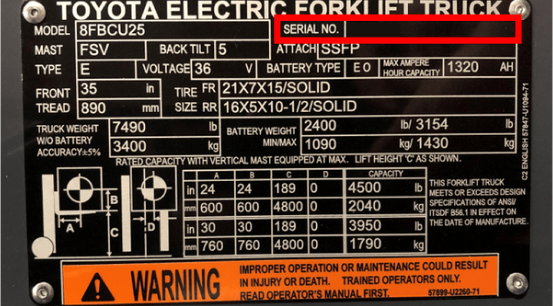How to Find Your Equipment Model Number.
Finding the right parts for your equipment is easy when you have your model and serial number which can be found on the data plate. Luckily, a forklift data plate is installed on every truck on the market to help you understand what your forklift can do and provide vital information.
Model Number: The model number of your toyota forklift is extremely important for relaying information to your dealers about repair or technical assistance and for looking up replacements part!
Serial Number: The serial number on your lift is the most important number.The model serial number combination will allow us to provide you with the parts that will fit your particular piece of equipment.

How to Find Your Equipment Serial Number
Finding the right parts for your equipment is easy when you have your model and serial number which can be found on the data plate. Luckily, a forklift data plate is installed on every truck on the market to help you understand what your forklift can do and provide vital information.
Model Number: The model number of your toyota forklift is extremely important for relaying information to your dealers about repair or technical assistance and for looking up replacements part!
Serial Number: The serial number on your lift is the most important number.The model serial number combination will allow us to provide you with the parts that will fit your particular piece of equipment.

Need some help? For further assistance or more information, contact your local Toyota Dealer.

Please click below to sign in to your MyToyota account
Don't have an account?

Where would you like to go?
Best Practices for Your Daily Walkaround

Having a daily forklift inspection may seem like such a simple task, but operators can be tempted to skip having this daily walk around. Finding a small issue with your forklift now, can prevent a larger problem from taking place later on. This not only protects your operators, but as well as any pedestrians and product that your forklift will be around. Not to mention, it is also stated in OSHA 29 CFR 1910.178 standard language that forklifts must be inspected before being put into service at the beginning of a shift or daily where vehicles are in round-the clock use. Here are some of the best practices when performing your daily forklift inspection.
Daily Walkaround Best Practices
Have A Checklist
Weather you’ve created the checklist, or the manufacturer has provided you a sample, having one helps ensure that your operator is looking over every part of the forklift. If you are improvising your required daily walk around, you may miss something important.
Make It A Routine
We understand things get busy and every facility gets hectic, but if you can implement an inspection at the beginning of every shift, it will eventually become a habit. Get into a routine, and stick to it. If you’re an operator, you’ll be more comfortable knowing you’re driving a forklift that is in safe, working order. If you’re a manager, you’ll have peace of mind that your operators are using forklifts that will work, maintain efficiency, and keep them safer.
If A Problem Is Found, Pull The Forklift
If you do find an issue, don’t run the forklift. Tag it out of your operation immediately. Safety should always be your first priority. You may be losing some money while the forklift is down, but you also may be protecting yourselves, or your driver, from something worse. Small problems can quickly turn into bigger costs and safety concerns. And downtime can be mitigated by having a full-line forklift supplier who provides excellent and timely service.
Keep in mind, different forklifts require different inspection checklists! If you have a large fleet with many different forklifts, make sure they have their own specific inspection sheets.